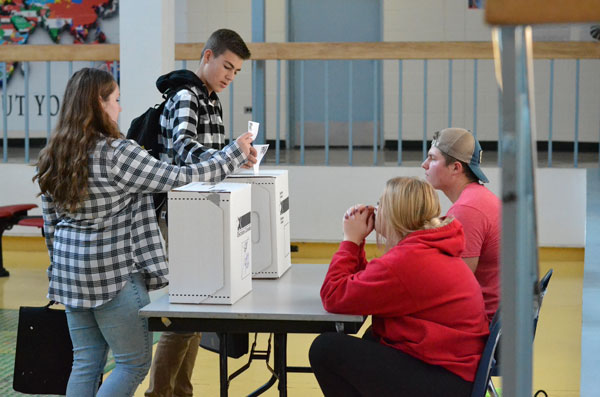
“It’s just basically a matter of teaching the kids how the world works, knowing the issues that make people interact and learning about how democracy works.” – Jeff Lohneis
Carlton Comprehensive High School students cast their ballots in a mock federal election on Wednesday.
They joined over one million students in researching party platforms and evaluating national leaders and local candidates in order to make informed decisions.
Despite being under the voting age of 18 years old, youth are given the opportunity to go through a realistic voting process and think about what they want from the federal government.
Students also get a glimpse into the job of an election worker by setting up polling stations, supervising voting and counting ballots.
The mock election is part of Student Vote Canada, which involves over 9,500 schools representing all 338 ridings.
It’s organized by CIVIX and is made possible with the help of Elections Canada.
Posters lined the walls of Carlton’s election space. They each read the name of a federal party and its leader, local candidate and platform.
“A lot of kids didn’t realize that what their input is is important,” said grade 11 student Bri Aszell.
Although she doesn’t actively research politics, Aszell said she was still able to vote based on political discussions she sees on social media.
She said she was aware of NDP leader Jagmeet Singh willing to form a coalition with the Liberals in order to defeat the Conservatives, for example, because she saw it on Instagram.
“Seeing stuff online helped me pick,” agreed another grade 11 student, Hannah Larocque.
“It’s just awesome to get to vote for who we want and who we think should be in (government).”
Jeff Lohneis, a social studies and history teacher at Carlton, said it’s important to show youth that voting is a privilege.
“It’s just basically a matter of teaching the kids how the world works, knowing the issues that make people interact and learning about how democracy works, and learning that democracy is a privilege and not everybody around the world has it,” he said.
Lohneis said not only does it allow youth to have a voice, but can also show adults the values of the next generation of voters.
“Sometimes as adults, we think teenage kids…think about the same issues that we do, and it’s just not always the case.”
Social science teacher Kelly Klassen said he hopes the mock election will ease away their voting fears.
“A lot of them are scared, not too sure what voting’s about,” he emphasized.
“There’s lots of kids that they approach the voting stations and they don’t even know what to do, like how do they get their ballot? Do they have to put their name on it?”
He said most students already have opinions based on conversations with their parents.
“This is one of those ways they can start thinking ‘What do governments do for me?’ and ‘What is their goal for me?’ and so they’re not always thinking about their parents, but they’re thinking about ‘Why is this important to an 18-year-old?’” said Klassen.
Earlier this month, incumbent Prince Albert MLA Randy Hoback (Conservative) and local candidates Estelle Hjertaas (Liberal) and Harmony Johnson-Harder (NDP) pitched their platforms and answered questions in a student forum at Carlton.
“Instead of just seeing the national leader’s face, they see a local person’s face,” said Klassen.
The results of Carlton’s mock election will be released on Tuesday morning. This is so the results don’t sway Monday’s official election results.

